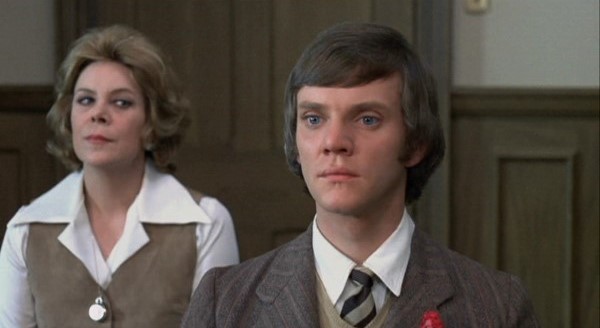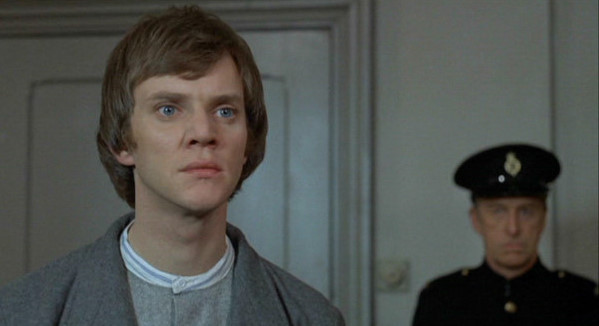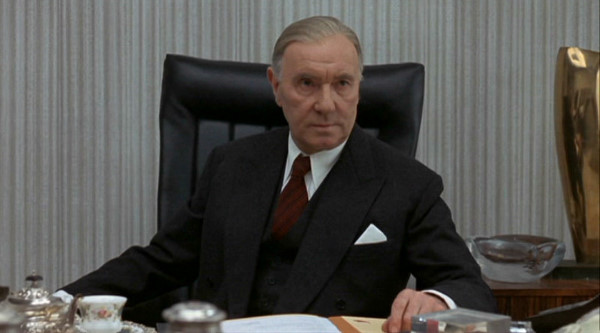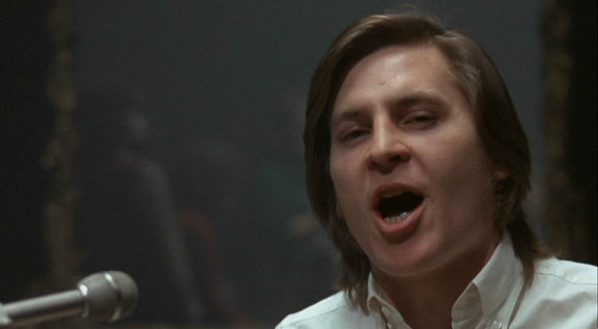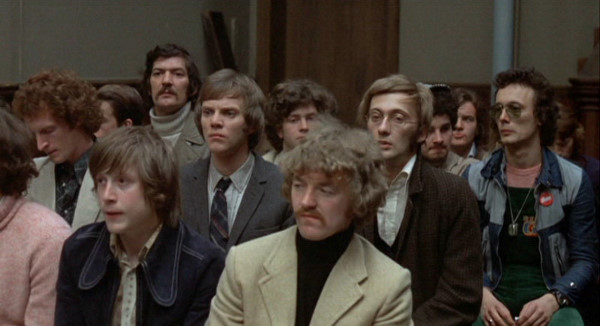|
Made in 1973, as a follow-up to 1968’s
If....,
O Lucky Man! transposes Voltaire’s
Candide
to modern Britain as it follows Mick Travis (Malcolm
McDowell) through the vagaries, hypocrisies and
amoralities of contemporary society. The viewer is
plunged, along with Mick, headfirst into all of this,
and is left reeling by what is a bewildering medley of
surrealism, realism, music, self-reference, satire,
spy-film, polemic and poetry. Of course, this doesn’t
make the reviewer’s job
easy. Threads must be grabbed, and synopses eschewed,
in the hope that some method or truth will be discovered
beneath the madness. What follows is an exercise in
thread-grabbing.
The most tangible strand – and thus the first
observation – is that O Lucky Man! is Lindsay
Anderson's epic. However, “epic” is here not meant in
the familiar swords-and-sandals sense, which evokes such
films as
The Ten Commandments (1956) or
Ben-Hur (1959), but in what Anderson designated the
“classical, poetic sense”.
The latter relates to a tale in which the main character
undertakes a journey; faces diverse situations and
characters; and, learning from his experiences, comes to
some moral revelation by the end of the work. This
schema certainly fits nicely onto O Lucky Man!,
just as it fits onto its literary precursors such as
Candide or Jonathan Swift's Gulliver's Travels.
Here Mick Travis bursts beyond the school boundaries
which defined
If..... to frolic across the whole
of Britain; he meets an assortment of characters who are
at once as outlandish and as recognisable as any
Lilliputian or Brobdingnagian; and he achieves a new
worldview by the end of the film.
However, if we are to consider films such as
The Ten Commandments
and
Ben-Hur
as exercises in sheer size and extravagance, there is
also something of the swords-and-sandals epic about O
Lucky Man!. Indeed, it is a swollen film in almost
every respect, and hits several record highs for an
Anderson picture. One such record high is the film’s
budget which, courtesy of Warner Bros, was the largest
Anderson was ever afforded;
another is O Lucky Man!’s running time, which stands at
just under three hours. The cast-list too is the
longest of Anderson’s career, and – from Ralph
Richardson and Rachel Roberts to Helen Mirren and Arthur
Lowe – is perhaps the British equivalent of those grand
casts which Mann and DeMille put together.
It is to Anderson’s great credit that so large an
“electric train set” is neither wasted nor used to
create a bloated Mammon of a film. Instead the results
are invigorating: O Lucky Man’s scale serves to amplify
its director’s polemic, making it the most compulsive
and iconoclastic entry in his filmography.
For their part in filling out Anderson’s Britain, the
cast of O Lucky Man! deserve further mention.
Many actors deliver career-best performances, often in
multiple roles. Take, for example, Arthur Lowe, who
plays three characters – Mr. Duff, Charlie Johnson and
(in “black-face” make-up) Dr Munda – and who won a BAFTA
“Best Supporting Actor” award for his efforts. The
ability to get the best from his players reveals the
benefit of Anderson’s meticulous work in theatre, and
ranks him alongside Alexander Mackendrick, Ingmar
Bergman and Paul Thomas Anderson as one of greatest
“actors’ directors” in cinema.
As the keystone of Lindsay Anderson’s company, Malcolm
McDowell again gives a superlative performance as Mick
Travis. His brand of oddly hard-edged innocence comes
across perfectly in a role which sees him confronted by
the worst that British society has to offer. However,
this is a Mick Travis which differs greatly from that in
If..... The Mick Travis of O Lucky Man! is
one who progresses through a series of jobs in search of
the twin Holy Grail that is promotion and recognition.
Gone, apparently, is the iconoclast to be replaced by a
go-getter; someone who claims that he “only wanted to be
successful”. It must have shocked first-time,
contemporary viewers of O Lucky Man! that a
former symbol of Sixties rebellion now wanted to get to
the top rather than shoot bullets into those who are
already there.
If....
Secondly, there is the fact that almost every single
woman in the film, from the stern Gloria (Rachel
Roberts) to the socialite Patricia (Helen Mirren), is
very easily attainable (in a sexual sense) for Mick.
Indeed, the film often veers towards masturbatory
fantasy – whether this fantasy is typical (as in the
strip-show scene) or not (as in the scene which shows
Mick being breastfed in front of a church altar).
Thirdly, the plot of O Lucky Man! comes across as
somewhat arbitrary. Mick’s adventures take him from
coffee factory to strip-show to government facility to
experimental hospital, and so on and so on, with little
consistency or reason. Along the way, many apparent
plot threads are discarded and have no later
consequences, such as the ‘Macguffin’ that is the
absconding coffee-salesman Ozwald, or the hint that Mick
might be a Russian spy.
What, then, are the results of Anderson’s autopsy on
Britannia? Certain themes emerge from the entrails;
many of which are similar to those in If….. In
particular, we see a trenchant portrayal of the
brutality and corruption of those on the upper rungs of
the social ladder. Policemen are depicted as little
more than uncaring criminals, and business-leaders abuse
their power. As Sir James (Ralph Richardson) points
out: “The dividing live between the House of Lords and
Pentonville jail is very, very thin.” However, to this,
O Lucky Man! adds further targets, many of which
were not present in its predecessor.
Of these new attacks, perhaps the most striking is that
which O Lucky Man! launches upon imperialism.
Indeed, the film sets itself up as anti-imperialist from
the moment of its “Once Upon a Time” prelude. This
prelude, shot in the style of a silent film, depicts a
group of natives working on a coffee plantation under
the steely eyes of the foreign, colonialist overseers.
When one of the natives (played by Malcolm McDowell)
steals some of the coffee, he is caught by an overseer
and subjected to a foreign form of “Justice” which
involves him getting his hands cut off. Without hands,
the coffee-picker will be unable to continue his trade,
and imperialism is thus depicted as cruel and
debilitating.
However, for O Lucky Man!, the evils of
imperialism have not abated with the decline of the
British Empire. In fact, imperialism is still rampant
in the modern age, and now expresses itself through a
subtler, economic control. This is particularly
apparent in the actions of Sir James, captain of
industry, who – we are told – once drove 500,000
Bolivian peasants from their farmland. As part of his
effort to invest money in the fictional African country
of Zingara, Sir James has no qualms about deploying
military forces in the region, and furnishing them with
the latest in chemical weapons technology – PL45 (aka
“Honey”) – to help “subdue” the local population. The
most shocking moment of O Lucky Man comes when the
effect of ‘Honey’ on native populations is depicted in a
slide show.
Bodies are shown contorted, charred and eviscerated; all
to the general approval of the business-minds gathered
in the room.
Throughout the film, the viewer is given constant
reminders of the dangers and inconsistencies of the
modern form of imperialism (perhaps we might call it
“globalisation”). A news story coming through Mick’s
car radio tells of how the Egyptian War Minister has
resigned over the “country’s relationship with the
Soviet Union”, and Mick questions a fellow Imperial
Coffee employee: “Do you realise that this Nigerian
coffee is being packed straight back to Nigeria?” In
this manner, O Lucky Man! taps into some very
recent debates, and should, at least for this reason, be
of interest to today’s public.
The manner in which the upper classes brutalise the
lower is also apparent in those scenes which follow
Mick’s release from prison. Here he spends his time
among the poorer elements of London, attempting to
spread a message of goodwill and brotherhood. The
decrepit, grey scenery and the queues for food at the
soup kitchens reveal an underworld that is far-removed
from the oak-panelled existence of Sir James. These
scenes of poverty serve as an indictment of the
inadequacies of the British welfare system; an attack
that would be further developed by the next Mick Travis
film, Britannia Hospital (1982). However, all of
this shouldn’t be taken as an indication that O Lucky
Man! sides unswervingly with the lower classes and
the downtrodden. No, the film’s portrayal of class is –
controversially – much more ambiguous and indeterminate
than that. After all, the poor are hardly lit in a
flattering light. They are portrayed as a gruesome
bunch – all rotting teeth, belligerence and sneers – who
think nothing of beating the well-meaning Mick to
near-death.
Here we might recall the aloof detachment of Lindsay
Anderson’s earlier O Dreamland (1953) which
portrays funfair revellers and, in particular, their
methods of amusement in a similarly unfavourable
fashion.
If....
Apart from its
(anti-)politics, another remarkable feature of O
Lucky Man! is its use of musical inserts. With a
soundtrack of songs provided by the singer-songwriter
Alan Price, the film frequently alternates between the
adventures of Mick Travis and footage of Price and his
band performing the songs, which comment-upon and
amplify the action of the film. This ploy not only
serves a similar function to the black-and-white
sequences in
If....,
but also
confuses the diegetic and the non-diegetic; collapsing
the traditional boundaries that exist between the story
world and the real world.
This technique calls to mind Jean-Luc Godard’s similar
experiments in One + One (1968).Yet – in its
determination to split from all of the traditional
methods and conventions of cinema – O Lucky Man!
also calls to mind the rest of Godard’s work. We see,
in O Lucky Man!, not only the musical performance
passages but also silent film passages; the use of
actors in multiple roles; and events in the film relayed
entirely through text rather than through imagery (to
name but a few of O Lucky Man!’s quirks). So, as
with
If...., it is not only the film’s message but
also its method which calls for a break with tradition.
However, at the same time, O Lucky Man! clearly
does owe some kind of debt to tradition; in particular,
literary tradition. Of course, there are the parallels
to Candide and Gulliver’s Travels, but
there are equally pertinent links to the work of George
Orwell. The most pointed of these is the inclusion of
Orwell’s collected-works in a scene in which Mick Travis
encounters Alan Price and his band. Following this
lead, one might regard the whole of O Lucky Man!
as something analogous to a ‘collected-works’ of
Orwell. Mick Travis’ adventure through the entire class
system recalls A Clergyman’s Daughter; the
oppressive state machinery and the subversion of justice
recalls 1984; the travelogue nature of O Lucky
Man! recalls The Road to Wigan Pier; the
scenes of poverty and distress recall Down and Out in
Paris and London; O Lucky Man! shares the
anti-imperialist tone of Burmese Days; and there
is even a scene in which a government medical facility
has grafted a man’s head onto a pig’s body – is this the
regime’s own version of the ‘four-legs good, two-legs
bad’ maxim of Animal Farm? There is also a
biographical similarity going on here – Orwell, like
Anderson, was a child of the Indian subcontinent who
also spoke out against the hypocrisy and tyranny of the
British class system.
And all of this – the literary references, the musical
sequences, the allegory, the beatings, the women, the
dreams and the persecution – comes crashing to a
startling, self-referential coda in which Mick Travis
auditions for a part in O Lucky Man! itself. In
this coda, Mick finds himself in a hall filled with many
of O Lucky Man!’s actual cast members, all of
whom are also going through the same audition process.
At the front of this hall, supervising proceedings,
stands Lindsay Anderson, who notices Travis in the crowd
and beckons him forward for a screen-test.
However, as Anderson asks Mick to “Smile”, Mick becomes
infuriated, asking “What’s there to smile about?”. Of
course, from what we have seen throughout the course of
the film, there seems to be very little, if anything, to
smile about. Despite this, Anderson manages, with much
coaxing, to draw the slightest (yet sincerest) of smiles
from Mick.
The film then cuts to Mick, and the rest of O Lucky
Man!’s cast, enjoying a wrap-party. All of them
dance in joy until we are left with the film’s final
image – that of Mick staring and smiling at a cascade of
falling balloons. This image is indelible, and forms an
astonishing counterpoint to final shot of
If....,
which shows Mick, all-wrathful, gripping a gun and
glaring through a cordite haze. At the end of O
Lucky Man!, then, Mick seems to have discovered
peace rather than rage. But what does it all mean?
For me, the answer lies in the lyrics of the Alan Price
song which accompanies the party: “If you’ve found a
reason to live on and not to die, you are a lucky man”.
Mick, it would seem, has just found this reason to “live
on and not to die”: for he has just found the world of
films and filmmaking. O lucky man, indeed!
And thus the end-note of O Lucky Man! is one of
optimism. Whilst the brave new world may preclude
political revolution, the opportunity for personal
revolution still remains. Here, O Lucky Man!
borrows Voltaire's concluding maxim from Candide:
“Il faut cultiver notre jardin” (“We must
cultivate our garden”). However, this strident,
optimistic note is mitigated by the same hopelessness
mentioned above. We may be lucky that we can withdraw
from society, but we are also unlucky insofar as that
same society cannot be changed into one from which we
feel no need to withdraw. The optimism of O Lucky
Man! is thus a hopeless kind of optimism.
And so a good handful of threads has been gathered.
What does it all come to? The response to this question
is surprisingly short: O Lucky Man! – with its
great depth of feeling; its inventiveness; its concern
for social matters; and its call to withdraw from the
evils of modern life – is Lindsay Anderson’s
masterpiece.
|

